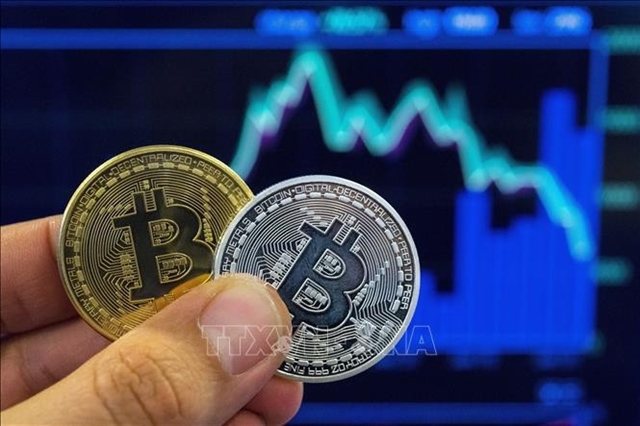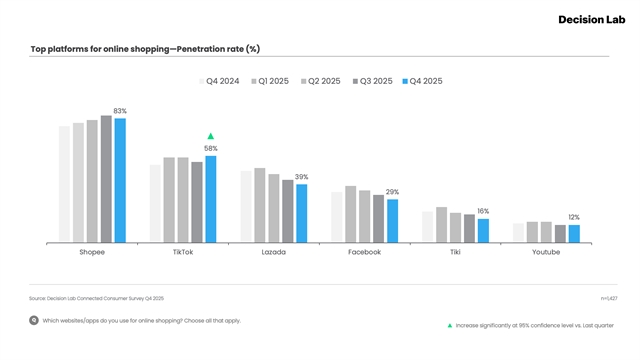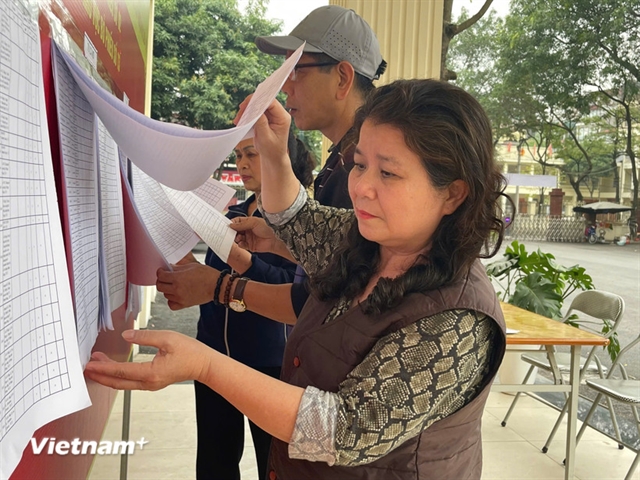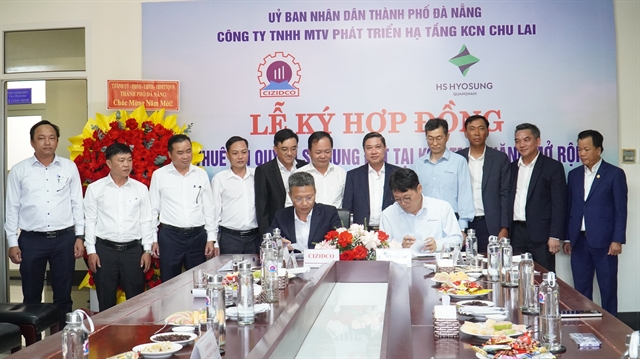 Economy
Economy

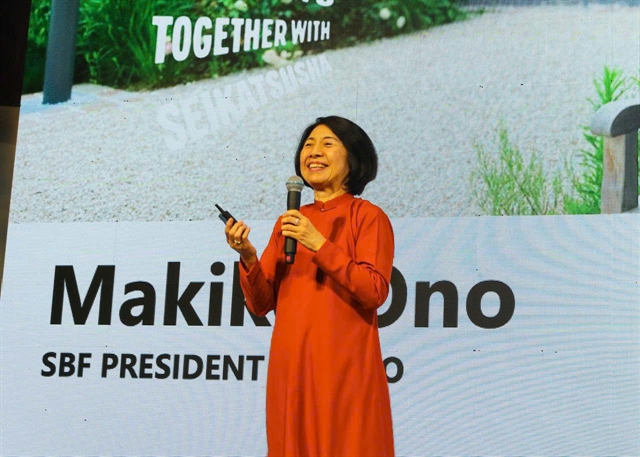 |
| Suntory Beverage & Food’s CEO Makiko Ono. Photo courtesy of the company |
In an exclusive interview with Việt Nam News on her recent visit to Vietnam, Suntory Beverage & Food’s CEO Makiko Ono reflects on her inspiring journey to the top. In the country, Suntory PepsiCo Vietnam is the strategic alliance between Suntory and PepsiCo. From championing diversity and a consumer-centric approach to driving sustainability initiatives like Việt Nam’s Mizuiku water education programme, Ono shares how Suntory’s unique culture and ambitious vision are transforming the company—and the world—while empowering women and local communities along the way.
As Suntory’s first female CEO, your leadership journey is truly inspiring. Could you share the key milestones that have shaped your path? How have these experiences influenced your leadership approach in driving the company forward?
There are three key milestones that have impacted and shaped my leadership approach. Firstly, M&A of overseas wineries, the importance of diversity.
I was involved in the acquisition of Château Lagrange in France while working in the new business development group of the international division, which was my first assignment. This was the first attempt by a Japanese company, and there were many challenges leading up to the acquisition. Through responding to various requests from the French government and engaging with multiple stakeholders, I gained knowledge of business planning, finance and accounting. By working with people from different cultures and values, I learned the importance of diversity.
Secondly, it’s the experience of being brand manager of an international Ice cream company, where I learnt 'Seikatsusha'* centric approach. I was in charge of marketing for the first time and developed many new flavours and categories.
I have a special attachment to the crispy sandwich.
It took many trials and errors before its launch, but I learned the importance of being 'Seikatsusha' - centric, by never compromising until we achieved high scores in customer surveys. I also gained first-hand experience in brand commitment and thorough brand management.
By leveraging the unique characteristics of the beverage business, we have developed products that go beyond the point of consumption, aligning with consumers' overall lifestyles.
Through core brand innovation, a methodology born in Japan, we have been able to anticipate and address the evolving needs of our customers. This approach has enabled us to continuously refine our brands, creating market-shaping products that not only meet but also exceed consumer expectations, earning long-term loyalty.
Build trust and strong engagement with employees, visit teams on-site and emphasise open communication. I became the first non-French leader in a company composed entirely of French employees.
On top of that, it was my first time as a CEO—an enormous challenge. Just a few months after I took on the role, COVID-19 struck, immediately putting my leadership to the test. While sales offices had to close, we needed to keep the factory running. We managed to sustain operations by calling for volunteers. Given the difficult circumstances, I focused on strengthening communication with employees, building trust and enhancing engagement.
Despite working remotely, I held one-on-one online meetings with about 50 managers, introducing myself, exchanging greetings and openly discussing their efforts and challenges. Even after the pandemic, I made it a priority to visit sites and engage directly with employees.
Through these initiatives, the volume of communication increased, fostering mutual trust. Based on that trust, concrete outcomes such as 'Oasis'- our major juice brand in France's core brand innovation emerged, leading the business onto a recovery track.
Through these two-way discussions, I was able to effectively communicate my vision while also fostering an organisation that enables the team to maximise its performance.
After my CEO appointment, I have defined the principle 'Who We Are – Always Together with Seikatsusha' as the organisation’s shared commitment towards consumers and a unifying core for our sprawling business. Moving forward, we will accelerate growth by harnessing the collective strengths in Suntory Beverage & Food, while staying close to market insights 'Gemba' and creating the value that matters to consumers.
Suntory is renowned for its unique corporate culture. How does this culture foster a diverse and inclusive workplace that supports talent and empowers women within the organisation?
Our values of 'Yatte Minahare', 'Giving Back to Society' and 'Growing for Good' engrain to the company as a whole and everyone. It’s not just about supporting the company’s growth, but growing ourselves, learning and trying new things, and becoming better at everything we do.
'Yatte Minahare' means the belief in taking on challenges and pursuing opportunities without hesitation.
My predecessor always encouraged employees with the phrase, “Failure is an option, not fear”, urging them to embrace risks and learn from their experiences. This mindset has shaped our company culture. My first 'Yatte Minahare' (or dream big) moment was moving to Paris, France, where I became the first female employee in Suntory’s 126-year history to work overseas.
In addition, we believe that people are the most important foundation of management. Being a global company means we need to understand the diverse needs of our customers around the world. Therefore, having a variety of perspectives and values is essential for business growth. And I believe DEI encompasses not only gender but also diversity in race, culture and values.
Therefore, I aim to create an organisation where all employees, regardless of gender, have equal opportunities to embrace 'Yatte Minahare' and fully realise their potential.
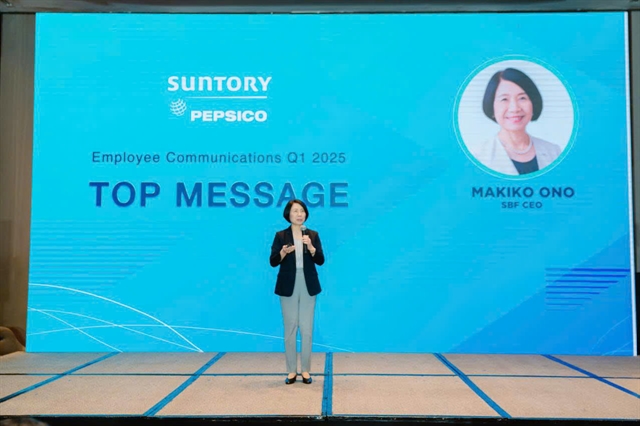 |
| Suntory Beverage & Food’s CEO Makiko Ono. In Việt Nam, Suntory focuses on six sustainability pillars, which are water, GHG actions, sustainable packaging, health and positive nutrition, DEI and enriching life. Photo courtesy of the company |
Suntory has demonstrated a strong focus and commitment to sustainability, which is deeply rooted in the purpose to 'Inspire the brilliance of life by creating rich experience for people in harmony with nature'. Could you share Suntory’s global sustainability priorities? How are these being rolled out in Việt Nam?
For us who conduct business by benefiting from the blessings of nature, sustainability is an inherent part of our business activities. The key themes Suntory focuses on globally are water, containers, packaging and greenhouse gas (GHG) emissions. We will bring together the technologies and expertise from across the Suntory Group to advance these initiatives.
On GHG emissions, we will begin using green hydrogen at the Hakushu plant in September this year. A carbon-free factory was also launched in Australia last year. This year, we will continue to accelerate our sustainability efforts with the combined strength of the entire group.
Locally, we have a customised approach to ensure we work in line with local government and empower local communities.
In Việt Nam, we focus on six sustainability pillars, which are water, GHG actions, sustainable packaging, health and positive nutrition, DEI and enriching life.
Regarding water, we have been focusing on expanding the 'Mizuiku programme' (Water Education). 'Mizuiku' refers to activities that teach children, who will lead the next generation, about the importance of water.
Việt Nam is the first company outside of Japan to implement the 'Mizuiku' programme. Through the strategic partnership with the Ministry of Education and Training since 2023, the programme has expanded nationwide and been incorporated into the official teaching curriculum at primary schools, educating 500,000 pupils by 2024. It has expanded to Europe and Asia. Going forward, we will lead global water sustainability initiatives, including water resource conservation and water-saving activities, in addition to 'Mizuiku'.
In the area of plastics, Suntory Beverage & Food became the world’s first to commercialise PET bottles made from used cooking oil. In Việt Nam, we are the first beverage company in the country to launch the first ready-to-drink option with 100 per cent rPET – Oolong TEA+ in 2023, and following the success of the first 100 per cent rPET beverage bottle – Pepsi in 2022, pioneering in multiple plastic reduction and recycling innovations.
Suntory is undergoing a global transformation. What are the key areas of focus for investment acceleration in Việt Nam?
As for accelerating transformation in Suntory Beverage & Food total for future growth, between 2024 and 2026, we intend to increase investment to accelerate organic growth through strategic expansion, including sustainability investment.
We invested in new production lines for the Bắc Ninh plant and broke ground for the new plant in Long An last year, to enhance the capacity in meeting the increasing demands of consumers.
With the growing health-conscious trend in the local market, we aim to increase the production capacity of products like the Oolong tea 'TEA+' and others.
Investment also resonates in building local talent. We are accelerating the exchange of talents and technologies across markets. We implement activities where expertise from overseas production sites come to Japan to learn about our know-how and mindset, as well as initiatives to share best practices from each country.
As a successful female leader, what advice would you give to women striving to balance their professional growth while maintaining a fulfilling personal life?
I was appointed, not because I am a woman, but because my international experience and diverse career background were valued. I encourage women who do not see role models to be pioneers themselves. If you open a door, others will follow. Don’t be afraid if you have a chance - you have others around to help you.
* Seikatsusha is a Japanese word which refers to all people surrounding the beverage business, including the broader meaning of 'consumer' encompassing purchasing and consumption moments. There is no suitable equivalent in other languages, so we use the Japanese term as it is. We see them as real individuals with emotions, not just consumers, who strive to understand their daily lives deeply beyond mere consumption moments.


